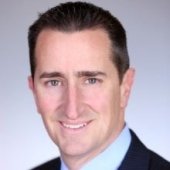NSW Health Pathology CEO: Patient empowerment, AI, Big Data are trends to watch in healthcare
IN BRIEF
- “Pathology is an integral part of that virtual hospital strategy, […] how we might use technology like point-of-care devices, which are sort of a lab in your hand when we’re out in peoples’ homes, and how do we help monitor patients remotely. We know that the functionality of wearables and biometric devices will certainly help keep people safe in those locations.”
- “What we continue to see is better health outcomes for patients when fast and accurate diagnosis and treatment pathways can be enacted. This includes the advantages that come from precision medicine, using genomics to really understand the cancer types that people have, and the ability to have personalized care, so target therapies deployed for a very specific cancer.”
- "The second area that I think is an important, emerging trend, and I say emerging but it’s here, and it’s real, and it’s growing really rapidly, is how we use AI and deep learning. We’re already seeing the advantages of that in image analysis and large dataset interpretations such as in whole genome sequencing, and it’s really helping to augment our expertise, not replace it.”
In this VISION by Protiviti podcast, we welcome Vanessa Janissen, CEO of New South Wales Health Pathology, where she leads Australia’s largest public pathology and forensic science service. Employing more than 5,000 people, NSW Health Pathology performs over 100,000 clinical and scientific investigations each day across 60 laboratories and more than 150 collection centers. Janissen is interviewed by Ruby Chen, a Director with Protiviti Australia.
In this interview:
1:05 – The digital agenda: Balancing patient privacy with data security
5:01 – The challenges of an aging demographic
8:05 – Strategies for employee wellbeing
13:10 – Pathology’s role in cancer care
18:38 – Emerging trends: Aging, AI, data analytics
Joe Kornik: Welcome to the VISION by Protiviti podcast. I’m Joe Kornik, Editor-in-Chief of VISION by Protiviti, our global content resource examining big themes that will impact the C-Suite and executive boardrooms worldwide. Today we’re exploring the future of government, and we welcome Vanessa Janissen, CEO of New South Wales Health Pathology, where she leads Australia’s largest public pathology and forensic science service. Employing more than 5,000 people, New South Wales Health Pathology performs over 100,000 clinical and scientific investigations each day, across 60 laboratories and 150 plus collection centers.
Sitting down with Janissen today is my colleague, Ruby Chen, a Director with Protiviti Australia. Ruby, I’ll turn it over to you to begin.
Ruby Chen: Great. Thank you so much for the introduction, Joe. Today, we’re so privileged to have Vanessa from New South Wales Health Pathology here on our podcast. Thank you so much for joining us today, Vanessa.
Vanessa Janissen: Thanks for having me, Ruby.
Chen: Let’s start off with a series of questions. The first one is around impacts on the community. As the CEO of New South Wales Health Pathology, I’m sure there are many things that get you excited about the organization, one of which I believe is the major inflight digital transformation agenda. The organization is looking to deliver a single digital patient record management system so that healthcare teams can access patient data anywhere in New South Wales. This will allow laboratories to connect and communicate for the first time in New South Wales’s history.
With New South Wales Health Pathology being the largest public pathology provider, you are custodians of a large store of patient data. So, many people may be wondering, how do you then balance patient privacy, data security, and IT resilience controls whilst ensuring comprehensive access to patient information for healthcare teams?
Janissen: It’s a great question, Ruby. It’s an exciting time in digital healthcare. It’s transforming the way healthcare is delivered globally, and fundamentally shifting how we consume health services as individuals. As you said, New South Wales Health Pathology, we’re working to transform our services and models of care to take advantage of new digital technology. We’re delivering patient services where they’re needed and connecting our 65 laboratories and 5,000 medical and scientific experts to deliver care in new ways that we haven’t been able to do before.
At the moment, we’re a very geography-based and constrained service. What I mean by that is pathology really relies on either having the expertise on each site of our 65 locations, or transporting specimens or samples across sites. The physicality of that way of working really has some logistical limitations, particularly if you live in regional and rural communities where you don’t always have access on site to that expertise, and you may have to wait longer for important clinical answers.
So, investing in digital is a real game changer for us in that space. Our investment in a single laboratory system that will connect and integrate our operations of 65 laboratories, adding to that the investment in technology that digitizes specimens and samples at the point of collection but allows them to be reported by specialist expertise across the state will really mean we can leverage our enormous capability in New South Wales to provide better answers, and therefore better patient care, and potentially hopefully outcomes for patients.
In terms to the risks relating to data, undoubtedly, as we become more digitally enabled and process reliant, and collect, as you said, a massive amount of data, we have to be aware of our risks and duties of accountability to protect our patients’ information. This is not a new problem or a new accountability for us. We’ve always done that. We’ve always had important and sensitive information that we need to protect, but certainly the scale and the impact of data breaches, data loss, and system outages is fundamentally different now.
I don’t think that means we shy away from that direction, because the upside of accessibility and integration and better care is phenomenal. What we have to do is really apply our clinical and corporate governance expertise into that new environment. How do we make sure we’re on top of having the right protections, controls in place, making sure we test their efficacy and our ability to respond and recover.
Chen: Perfect, yes. Thank you so much for sharing that. I guess particularly across different industries in recent years, having sufficient corporate governance and oversight around the cybersecurity is such an important topic. So, then in terms of our next question, this is just around overall challenges particularly with changes in demographics.
According to the Australian Bureau of Statistics, Australia is facing an aging population due to increasing life expectancy and declining fertility rates. It’s estimated that by 2026, which is not long from now, more than 22% of Australians will be over 65 years of age. Would you mind sharing what strategies are being put in place to ensure pathology services and diagnostics services are tailored for this growing demographic?
Janissen: Certainly, as we have a larger older population in the community, for New South Wales Health Pathology, we will need to scale our capacity in our services of hospital to meet that additional demand and complexity of care, and we’ll do that through a number of ways; utilizing automation, robotics, the use of digital as we’ve spoken, and I think AI has an important part to play in ensuring we can continue to provide those levels of services out to that community. But we also know that people don’t fundamentally like being in hospitals and will prefer to receive care in other settings, and certainly our vulnerable, elderly patients often have poorer outcomes in hospitals with increased rates of delirium and falls.
So, we need to think about what care looks like in people’s homes, whether that be their traditional family home or whether that’s residential age care homes. We’ve seen the advent of virtual hospitals and I think that’s part of the answer. Virtual hospitals really came to the fore through necessity in COVID and lockdowns, but certainly they’re now taking off more mainstream where people can receive treatment in their home while being virtually monitored at remote locations.
I think pathology is an integral part of that virtual hospital strategy, not just in the way we participate in collecting samples for diagnostic purposes to help treat patients, but also how we might use technology like point-of-care devices, which are sort of a lab in your hand when we’re out in peoples’ homes, and how do we help monitor patients remotely. We know that the functionality of wearables and biometric devices will certainly help keep people safe in those locations. So, we’re really looking at our investment and how we partner with the local health districts and the hospitals around enabling that virtual setting.
Chen: Yes, that actually sounds really interesting and it gives me a lot of hope for my future when I get to that age group.
Janissen: Absolutely. We’ve got to get right before we get there, Ruby. [Laughter]
Chen: Exactly. Thank you for that. Now moving on to the next question, this is around employee well-being, which again I think it’s quite a topical area particularly in the last few years kind of post-COVID/pandemic. It has been relatively tough for some of our healthcare workers across the state.
I understand that New South Wales Health Pathology is investing in new technologies such as AI and robotics to reduce the manual burden on pathologists and scientists, referring back to what you had mentioned earlier but for slightly different uses. You have also launched a revised people strategy to ensure staff well-being continues to be looked after. Would you be able to shed more light on these initiatives and others to improve employee well-being?
Janissen: Our team worked incredibly hard during COVID to protect the community. We did over 15 million tests in the peak two years, an enormous amount of work, working in ways we’ve never had to work before. With that ambitious change agenda that I mentioned in our first question, it’s really important that we think about how we invest in our people alongside of that process.
People are at the heart of what we do, and every discussion, survey and interaction, it’s really clear to me how proud we are to serve the New South Wales Community, and that people gain a tremendous amount of professional and personal satisfaction coming to work and being a part of a team that has such a positive impact. However, feedback also tells me that fatigue is real and prevalent post-COVID, and the challenging daily realities are impacting on people’s experiences and leaving people feeling tired, sometimes undervalued and overwhelmed when change is happening.
That’s why we’ve really invested a lot of time in developing our people strategy. It’s our map for achieving a culture we all seek, investing in things that our team told us were really important. We spent six months consulting with our staff around what is it that makes them feel welcomed and valued, and that’s the core of it. Our vision for every person who works for New South Wales Pathology is that they feel they belong, a place where everyone feels safe, valued, and supported to do their roles and be the best that they can be.
To achieve that, our people strategy really focuses on six priority outcomes: that our teams feel safe and valued; that our leaders are considerate, accessible and authentic; that people’s work is meaningful and attractive; that we grow, develop, and help people achieve their goals; that we can help them balance work and other important aspects of their life; and we represent the diverse communities that we serve.
We’re really going to focus heavily on the first two; people feeling safe and valued, and that our leaders are consistently supporting them. They’re the top two priorities for focus of our investment. That’s what our team told us was most important to them. The sorts of things we’ll be working around is how do we manage sustainable workloads, making sure that people have access to the right level of training, that we have good rostering practices, that we have new technology that helps free them up to do things more easily.
We’ve commenced a range of psychological safety, well-being, and trauma-informed practice and development of our people leaders and their teams. We’re building on the success of our recruitment model and investing in other initiatives that will attract to make it quicker and easier for people to join our organization, and we’re also recognizing the important relationship that people have with their managers and investing in a whole range of leadership training programs for our clinical leaders, our senior operations team, and medical frontline leaders, and of course, important that we have an advocate for modern awards that recognize the value of what people do in their job.
Chen: That sounds like a very structured approach to the people strategy and something that I probably don’t hear as often.
Janissen: Yes. I mean you’ve got to have a plan and you’ve got to have a focus around people. People are the backbone of our organizations, and when there’s so much going on in terms of out in their personal lives, and in their work environments, and technology coming at them, really focusing in how we support people is absolutely critical.
Chen: All right, awesome. Let’s move on to the next question then. This is a little bit more forward-looking.
There has been investment into cancer care through precision oncology technology, and training and retaining anatomical pathologists in order to provide services for personalized cancer care based on specific biomarkers and their tumor and genetic makeup. Where do you see New South Wales Health Pathology progressing in the cancer care field in the next few years?
Janissen: It’s a really important area for us to focus in on. Diagnosis and treatment of cancer is a core part of our role in New South Wales Health Pathology. Every year, we average about 450,000 tests that are looking for and diagnosing what type of cancer people might have, and unfortunately, it’s a growing area of demand. Last year, we saw about 11% increase in that area, not only in numbers of tests but also what we’re seeing is a shift in complexity. I suspect that’s a part of changing demographics as we get older, but also potentially a result of delayed screenings and limited access to care during COVID, which is really sad.
The good news is that what we continue to see is better health outcomes for patients when fast and accurate diagnosis and treatment pathways can be enacted. This includes the advantages that come from precision medicine, so using genomics to really understand the cancer types that people have, and the ability to have personalized care, so where we target therapies deployed for a very specific cancer. New South Wales Health is leading the way in developing both of those fields, and we’re really proud that Richard Scolyer, the Australian of the Year, is actually an anatomical pathologist in our organization, and he’s a perfect example of those innovations. He’s generously sharing his lived experience of diagnosis and treatment of brain cancer, and the great outcomes as a result of that.
What does it mean we need to invest in? What we’re going to be focusing around is our cancer genomics capability, so using new genome sequencing technology and translation of research into new testing protocols to be more accurate in our diagnosis. We’re expanding our team’s capability, so investing in genetic pathologists, the registrars that train, developing a very specific scientific workforce in this area, and in particular, an investment in bioinformaticians, because genomics produces a massive amount of data, and it’s the interpretation of that data that we need to be really good at. We’ll also continue to partner with world-leading researchers and institutes that advance knowledge of what good cancer care and good cancer diagnosis can look like.
Chen: Yes. I was actually just about to ask you about whether or not you have partnerships and alliances with other overseas institutions. I guess in some other jurisdictions, the cancer rates are also relatively high if not higher than what we see in New South Wales. Would you mind sharing a little bit about the types of research that you’ve been doing jointly with some of the world leading institutions?
Janissen: We partner specifically with our hospitals and local health districts, and quite often, they have onsite research institutes and connection into international research institutes. So, that local partnership is critically important because then you’re focusing in on a range of local need and demand in that area, but also the expertise, that multidisciplinary research support is really critical. At New South Wales Health Pathology, we can participate in that in terms of the capability, we have our experts in areas like anatomical pathology, but also we operationalize a biobank, which is an area that collects and stores specimens that goes into helping in research, in clinical trials, to really support those researchers on the ground to make those advancements.
Chen: That sounds amazing. I really look forward to seeing more research outcomes and benefits for people who are going through a cancer diagnosis and treatment. I think it sounds quite promising. I’m hoping there will be a breakthrough collectively as a lot of the leading organizations come together. Okay, great.
The last question we have here for you, Vanessa, is just a little visionary. We’ve talked about emerging trends from enhancing digital experiences, to increasing controls around IT security, Australia’s aging population, improving employee well-being, and the previous question around the cancer key initiatives. Could you share your thoughts on any other emerging trends that New South Wales Health Pathology will need go grapple with in the next five to ten years, and how else do you see the organization shaping into the future?
Janissen: I think there’s three things that are on my mind around the future. The first is really about this ongoing need to empower our patients in their care. That’s what we hear from patients; they want to have more control, choice, and activate preventative care earlier in their lives, and I think the growing capability around point of care testing and biometric devices that really allow people to gain access to their information personally early to help them manage their diseases, to enable them to access and change their lifestyle to support better outcomes, is something that we really need to support, and I think for New South Wales Health Pathology, we’ve got a really good role to play in that because we do have the expertise around how to interpret data, how to interpret results. So, I’m thinking about how do we connect that expertise into patients when they’re in control of their care in whatever setting that might be.
The second area that I think is an important, emerging trend, and I say emerging but it’s here, and it’s real, and it’s growing really rapidly is how we use AI and deep learning. We’re already seeing the advantages of that in image analysis and large dataset interpretations such as in whole genome sequencing, and it’s really helping to augment our expertise, not replace it. So, how do we maximize that support, how do we ensure that our teams have got the right tools, they’re applying those tools in a safe way to do their job, but also to free them up to do the parts of their job that matter most, which is the human-to-human contact.
The third area that I think is again rapidly emerging is big data analytics and being able to look at trends through big data and population insights. I think through that area, what we can be doing is looking at the prediction of care needs, really thinking and seeing how is patients’ health performing, where are they starting to see deterioration in their health, and how can we translate that into care needs and models of care, and into research requirements.
So, I think they’re a couple of the important trends that we’re thinking about, but inevitably, what matters most is how we support our people to have the capability, the time to engage, to collaborate, to partner in those emerging trends to identify the incredible opportunities and bring them into reality for the communities we serve.
Chen: Yes. I think you’ve raised some very important areas, and I guess the thematic which is around data and information in general. From gaining access to data early, to AI and big data analytics and deep learning, they all kind of fit within IT and information, and that kind of a bucket, right, so that’s really interesting to hear.
Janissen: Yes, and that really reshapes I guess in some ways kind of what our workforce needs are as well. So, we’re thinking about how does that play into our people strategy in terms of the new jobs that will be coming along, and how do we attract and retain that expertise in that area that really, we haven’t had to have in our workforce before. So, it’s a really exciting time.
Chen: Really, really interesting. Thank you so much, Vanessa. I’ve learned so much just over the past half an hour or so about New South Wales Pathology and also just pathology in general. That’s been super helpful and very insightful. I would just like to take the opportunity to thank you so much for your time in this podcast.
Janissen: Thanks very much for having me, Ruby. It’s been a great conversation.
Chen: Yes, thank you. Okay, great. Well, Joe, we’ll hand it over back to you.
Kornik: Thanks, Ruby, and thanks, Vanessa, and thank you for listening to the VISION by Protiviti Podcast. Please rate and subscribe wherever you listen to podcasts, and be sure to visit vision.protiviti.com to view all of our latest content. Until next time, I’m Joe Kornik.
Vanessa Janissen is the CEO of NSW Health Pathology where she leads Australia’s largest public pathology and forensic science service. Employing more than 5,000 people, NSW Health Pathology performs over 100,000 clinical and scientific investigations each day across 60 laboratories and 150-plus collection centres. She’s spent over 25 years in healthcare, both in public and private settings, with a deep commitment to serving the community and the strategic pursuit of better outcomes for people. She is also passionate about growing and developing future leaders, particularly championing and supporting women in leadership positions. Previously, Vanessa held a number of leadership positions at Calvary Healthcare, most recently as the National Director, Strategy and Service Development, leading their strategic growth across hospital, aged care, community and virtual care services.
Ruby Chen is a Protiviti director with over 12 years of experience in the financial services industry, for 10 of which she worked within the Big Four banks before transitioning into consulting. She has a broad range of experience providing advisory services and secondments across all three lines of defense.
Did you enjoy this content? For more like this, subscribe to the VISION by Protiviti newsletter.






















